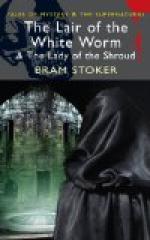“The result of the quarrel was that the son left the house without a reconciliation or without even telling his father where he was going. He never came back again. A few years after, he died, without having in the meantime exchanged a word or a letter with his father. He married abroad and left one son, who seems to have been brought up in ignorance of all belonging to him. The gulf between them appears to have been unbridgable; for in time this son married and in turn had a son, but neither joy nor sorrow brought the sundered together. Under such conditions no rapprochement was to be looked for, and an utter indifference, founded at best on ignorance, took the place of family affection—even on community of interests. It was only due to the watchfulness of the lawyers that the birth of this new heir was ever made known. He actually spent a few months in the ancestral home.
“After this the family interest merely rested on heirship of the estate. As no other children have been born to any of the newer generations in the intervening years, all hopes of heritage are now centred in the grandson of this man.
“Now, it will be well for you to bear in mind the prevailing characteristics of this race. These were well preserved and unchanging; one and all they are the same: cold, selfish, dominant, reckless of consequences in pursuit of their own will. It was not that they did not keep faith, though that was a matter which gave them little concern, but that they took care to think beforehand of what they should do in order to gain their own ends. If they should make a mistake, someone else should bear the burthen of it. This was so perpetually recurrent that it seemed to be a part of a fixed policy. It was no wonder that, whatever changes took place, they were always ensured in their own possessions. They were absolutely cold and hard by nature. Not one of them—so far as we have any knowledge—was ever known to be touched by the softer sentiments, to swerve from his purpose, or hold his hand in obedience to the dictates of his heart. The pictures and effigies of them all show their adherence to the early Roman type. Their eyes were full; their hair, of raven blackness, grew thick and close and curly. Their figures were massive and typical of strength.
“The thick black hair, growing low down on the neck, told of vast physical strength and endurance. But the most remarkable characteristic is the eyes. Black, piercing, almost unendurable, they seem to contain in themselves a remarkable will power which there is no gainsaying. It is a power that is partly racial and partly individual: a power impregnated with some mysterious quality, partly hypnotic, partly mesmeric, which seems to take away from eyes that meet them all power of resistance—nay, all power of wishing to resist. With eyes like those, set in that all-commanding face, one would need to be strong indeed to think of resisting the inflexible will that lay behind.




